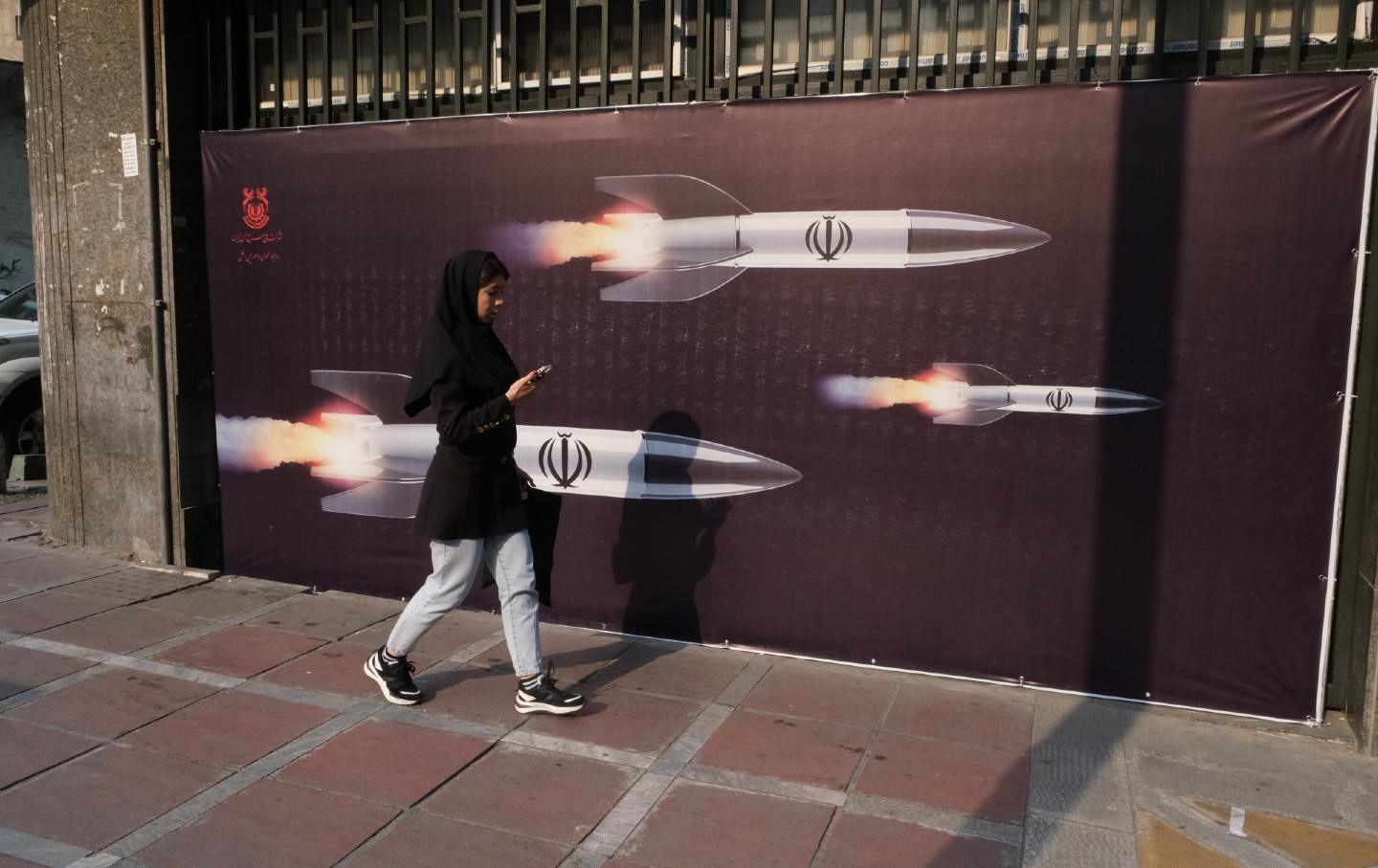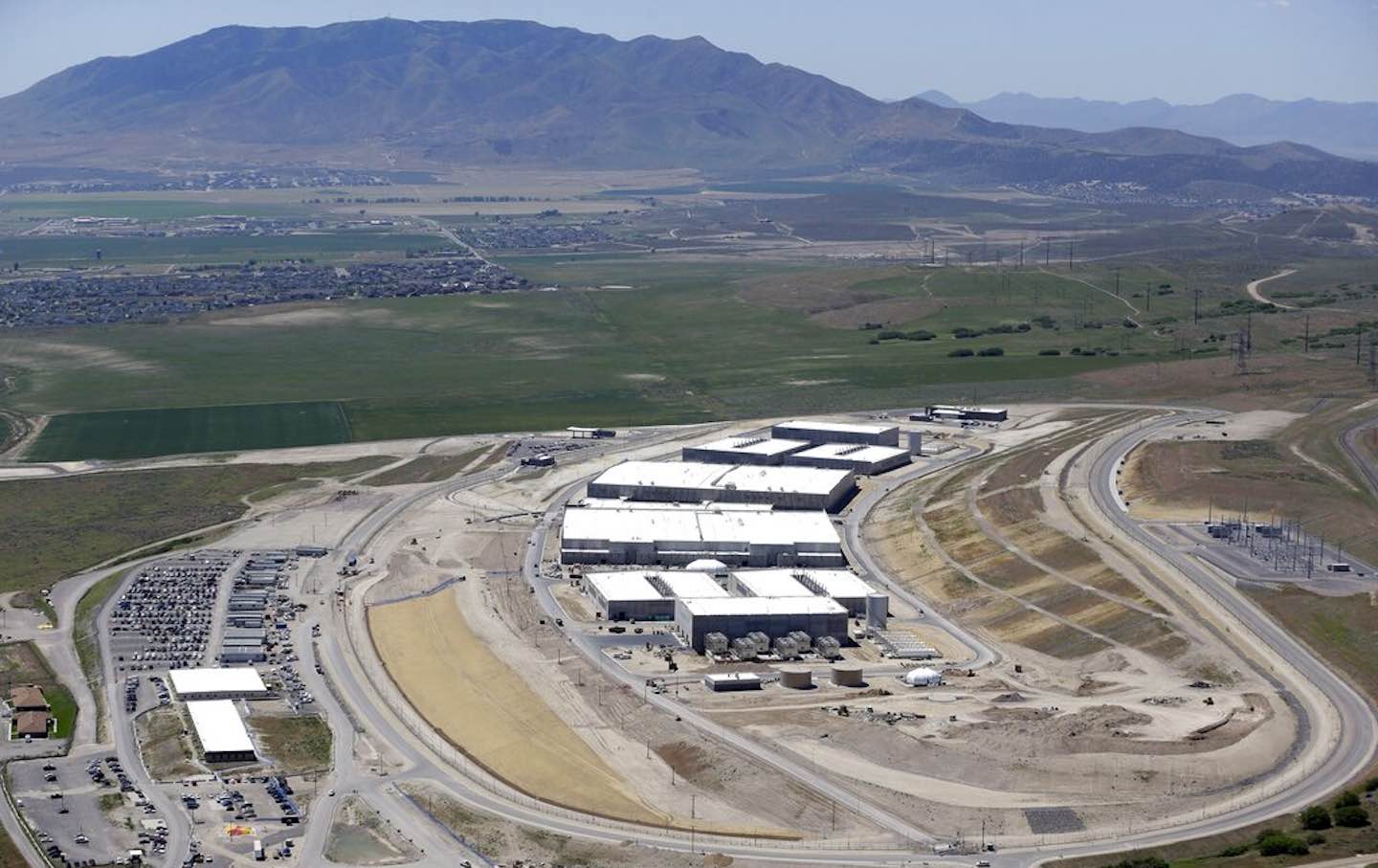The political and media class is doing what it always does with the US and its allies: trying to frame deliberate atrocities as tragic mishaps.
People prepare to transfer the body of a World Central Kitchen WCK worker killed by Israeli air strikes, near the Rafah border crossing, in the southern Gaza Strip, on April 3, 2024.
(Khaled Omar / Xinhua via Getty Images)
There could hardly be a clearer war crime than Israel’s killing of seven World Central Kitchen aid workers earlier this month. The strike was deliberate, in line with Israel’s demonstrated pattern of targeting aid workers, journalists, and doctors. The victims’ cars were marked with the World Central Kitchen logo, and the charity was communicating their position directly with the Israeli military. The IDF bombed three vehicles in succession, the second carrying survivors from the first, and the third carrying survivors from the second.
Yet, in the wake of the attack, the US media and political class scrambled to frame Israel’s patently deliberate strike as a horrible mishap. The New York Times described a “botched operation” replete with “lethal mistakes and misjudgments.” Another Times headline referred to a “cascade of errors” by Israel. According to CNN, President Biden was “furious” about the “tragedy,” which he described as a “failure” of the Israeli military.
This pattern—first, an Israeli war crime, then a flood of stories describing American “outrage” at the “tragic” Israeli “error,” hammered home by a sternly worded message from Biden—is part of a time-honored rhetorical device that transforms every bloody action by America or its allies into a heartbreaking blunder made by well-meaning people.
In this surrealist version of events, Israel’s war is just and necessary, but, hijacked by Israeli Prime Minister Benjamin Netanyahu and his mistake-prone gang of hard-liners, it has gone awry. Case in point: In a widely discussed speech, Senate majority leader Chuck Schumer blamed “extremists” in Israel’s government for the country’s failure to live up to its “values,” lamenting, “Israel is falling short of upholding these distinctly Jewish values that we hold so dear. We must be better than our enemies, lest we become them.”
Current Issue

Schumer’s comments were echoed by Senator Bernie Sanders, who castigated Netanyahu for turning Israel into a “religious fundamentalist country.”
Last weekend, the Times’ editorial board laid out this argument quite nakedly. The board portrayed Netanyahu and his “ultranationalist allies” as rogue extremists—while casting Biden as a weary, benevolent peacemaker, whose calls for “restraint and humanitarian help” have gone unheeded.
What this narrative obscures is that Netanyahu is not an aberration. Nor are Israel’s crimes errors. Nor do they contradict its supposed values. On the contrary, they embody the values of Israel’s genocidal war on Gaza—just as past US interventions have embodied this country’s imperial aims.
The US has found it increasingly difficult to claim leadership of the “rules-based international order” as Israel flouts international law and openly undermines the United Nations. Even high-ranking State Department officials acknowledge that the war is creating a “major credibility problem.”
With each image of a Palestinian corpse mangled by tanks, each mass execution in the courtyard of a hospital, each emaciated child who starves to death, and each American ambassador who smugly vetoes a UN cease-fire resolution, the hypocrisy deepens.
But the contradictions of the US-led world order do not guarantee its collapse. As the ever-prescient cultural theorist Stuart Hall taught us, “every crisis is also a moment of reconstruction.” And the US has certainly proved capable of reconstructing and fortifying its legitimacy in the past. Situated historically, it becomes clear that the tepid position being served up by Biden, Schumer, and the Times is yet another attempt at this kind of ideological reconstruction.
In the opening to Ken Burns’s widely acclaimed docuseries The Vietnam War, a disembodied voice narrates over a wistful folk song and dusty images of American soldiers: “[The war] was begun in good faith by decent people out of fateful misunderstandings, American overconfidence and cold war miscalculation.”
This version of the war as a regrettable “good-faith” error is not limited to historical retrospectives. It was being created in real time, by some of the most influential journalists and political operatives of the day.
Walter Cronkite peddled the tale of a valiant cause that lost its way in his famous 1968 broadcast that is thought to have turned the tide of public opinion against the war. The war was now a stalemate, he told his audience, but the Americans were “an honorable people who lived up to their pledge to defend democracy, and did the best they could.” Former defense secretary Robert McNamara, one of the war’s chief architects, shared parallel reflections in his 1995 memoir: “[We] acted according to what we thought were the principles and traditions of this nation. We made our decisions in light of those values. Yet we were wrong, terribly wrong.”
The apotheosis of this narrative might come from George Ball, a former under-secretary of state for both Kennedy and Johnson, famous for his internal opposition to escalating the conflict. In 1973, he wrote a reflection called “The Lessons of Vietnam”:
[The war was] a defeat not because our initial purposes were unworthy but because—in frustration and false pride and our innocence of the art of extrication—we were forced to the employment of excessively brutal means to achieve an equivocal objective against a poor, small, backward country.
Ball also called the war a “mistake,” a “misjudgment,” a “misadventure,” a “misappraisal,” and a “misassessment.”
Popular
“swipe left below to view more authors”Swipe →
Does any of this sound familiar?
Rather than a bastardization of American principles, it would be more accurate to describe the Vietnam War as a logical outgrowth of American principles—primarily, the violent pursuit of Cold War hegemony.
Similarly, the Iraq War is proof positive that the US will lie, kill, and torture to achieve its self-interested goals. But it, too, has been historicized as a tragic blunder rather than a damning indictment of US empire. The fact that six successive presidents have bombed Iraq does nothing to puncture this facade. (To this point, Times columnist David French recently wrote a column titled “Israel is making the same mistake America made in Iraq.”)
As in Vietnam and Gaza today, the “mistakes” discourse kicked off while the war was still raging. In early 2004, as it became clear that there were no WMD in Iraq, columnist and Iraq war supporter Jonathan Rauch wrote in The Atlantic:
Had I known then what I know now, I would have opposed it. Next question: Does that mean the war itself was a mistake? Yes. But it was a special kind of mistake: a justified mistake.
A policeman shoots a robber who has killed in the past and who brandishes what seems to be a gun. The gun turns out to be a cellphone. The policeman expects a thorough investigation (and ought to cooperate). In the end, if he is exonerated, it is not because he made no mistake but because his mistake was justified. Reasonable people, facing uncertainty, would have thought they saw a gun.
In 2008, then-candidate Barack Obama called the war a “grave mistake.” (It is notable that he thought the war was a mistake not because of the mass suffering we inflicted on the Iraqi people but because it distracted the US from its war in Afghanistan.)
Or consider a 2023 essay by David Frum, one of President Bush’s speechwriters in the buildup to the Iraq War. In “The Iraq War Reconsidered,” published in The Atlantic, Frum argued that the US “went to war to build democracy in Iraq,” hoping to “bring stability to the Middle East,” before the invasion and occupation turned into a “grave and costly error.”
Other reformed Iraq War cheerleaders, like Max Boot and David Brooks, have offered retroactive, measured criticisms that assume America’s good intent. In 2023, Boot wrote: “In [Afghanistan, Iraq and Libya], the United States was so eager to spread democracy, just as it was once eager to contain communism, that it inflicted great misery on the very people it was supposed to be helping—and then left them in the lurch.”
The narrative that portrays America as an “eager” but mistake-prone superpower intent on spreading democracy would be comical if it wasn’t so pervasive.
The 2011 NATO intervention in Libya followed a nearly identical arc. In addition to propagating outright fictions in order to build a pretext for the bombing campaign, the press cheered the Obama administration’s supposedly humanitarian mission. There was little pushback as NATO’s intervention morphed into a regime-change operation, which left Libya a failed state wracked by civil war. Fittingly, Obama would later call his failure to plan for a post-Gadhafi Libya the “worst mistake” of his presidency.
In 2016, the Times profiled Hillary Clinton—the premier Libya hawk in Obama’s White House—producing an eerie mirror of Burn’s introduction to The Vietnam War: “Mrs. Clinton’s deep belief in America’s power to do good in the world ran aground in a tribal country with no functioning government, rival factions and a staggering quantity of arms.”
Each of these wars occupy specific niches in the American cultural consciousness. The through line, however, from Vietnam to Palestine, is an insistence on historicizing what are predictably bloody acts of empire as blunders and missteps. In this fiction, any unsavory outcomes are attributed to errors that contradicted American (or Israeli) “principles.”
But what are American “principles,” if not coercing, bullying, and warring with any nation that stands in its way? What are Israel’s “values,” if not the violent erasure of the Palestinian people?
In the same way that Iraq, Libya, and Vietnam have been mythologized to assume benevolent intent, the White House and its dutiful media accomplices are frantically reframing Israel’s genocidal assault on Gaza as a tactical error, a just war that has been derailed by Netanyahu and his right-wing allies. This rhetoric shields the underlying system of US-Israeli imperialism from critique.
Don’t be fooled by their cynical attempts to save face. The whole system is guilty.
Thank you for reading The Nation!
We hope you enjoyed the story you just read. It’s just one of many examples of incisive, deeply-reported journalism we publish—journalism that shifts the needle on important issues, uncovers malfeasance and corruption, and uplifts voices and perspectives that often go unheard in mainstream media. For nearly 160 years, The Nation has spoken truth to power and shone a light on issues that would otherwise be swept under the rug.
In a critical election year as well as a time of media austerity, independent journalism needs your continued support. The best way to do this is with a recurring donation. This month, we are asking readers like you who value truth and democracy to step up and support The Nation with a monthly contribution. We call these monthly donors Sustainers, a small but mighty group of supporters who ensure our team of writers, editors, and fact-checkers have the resources they need to report on breaking news, investigative feature stories that often take weeks or months to report, and much more.
There’s a lot to talk about in the coming months, from the presidential election and Supreme Court battles to the fight for bodily autonomy. We’ll cover all these issues and more, but this is only made possible with support from sustaining donors. Donate today—any amount you can spare each month is appreciated, even just the price of a cup of coffee.
The Nation does not bow to the interests of a corporate owner or advertisers—we answer only to readers like you who make our work possible. Set up a recurring donation today and ensure we can continue to hold the powerful accountable.
Thank you for your generosity.
More from The Nation

World / April 19, 2024 Israel’s Attacks on Gaza Are Not “Mistakes.” They’re Crimes. The administration’s blatant double standard demonstrates that the new “liberal internationa…
Jeet Heer

If the Senate passes an expansion of the Foreign Intelligence Surveillance Act, any American’s international communications could become an open book.
James Bamford

When Jews were being slaughtered by the Nazis, the world turned away. Now, the world has awakened to Israel’s crimes.
Ellen Cantarow

US and Russia have a long history of polar science cooperation.
Pavel Devyatkin

In Everyone Who Is Gone Is Here, Jonathan Blitzer examines how North and Central American migration moves in two directions.
Books & the Arts
/
Gaby Del Valle

The genocide happening in Gaza today may foreshadow one possible future for this planet.
William Astore

